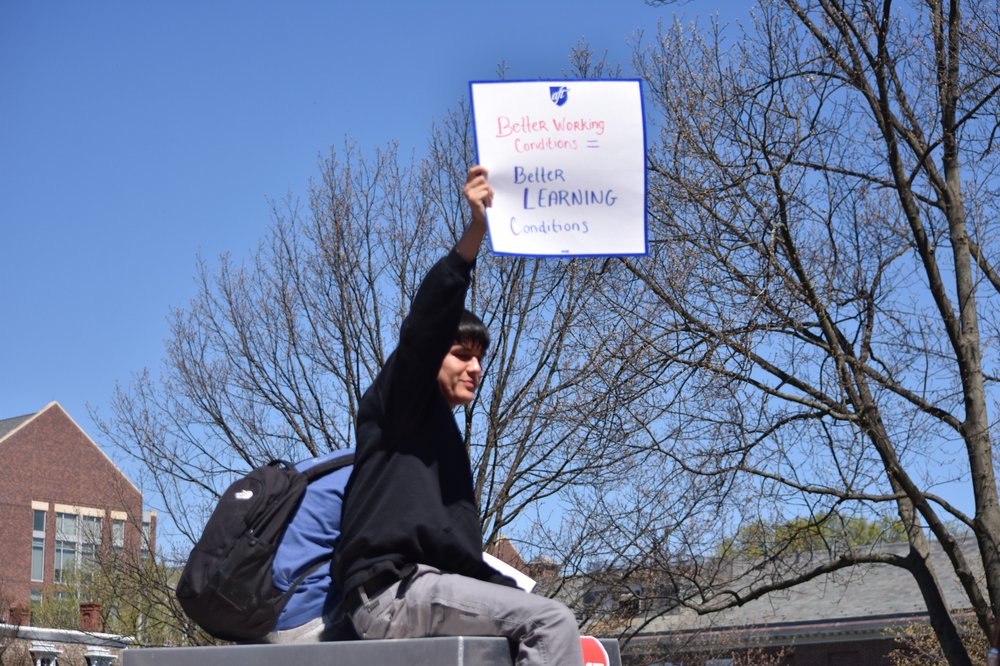Rutgers faculty has contract deal after long negotiations and a strike. Unions still must vote.
April 28, 2023, 5:54 p.m.
Students are just days away from finals, and unions held out the possibility of resuming their strike if they hit an impasse.

Rutgers University and its faculty unions agreed to contract language on Friday that could finally end the nearly yearlong negotiations that led to a strike earlier this month.
The unions’ executive committees will vote on the language on Sunday. If that language is approved, it becomes a tentative agreement that will then go to the full membership for a ratification vote.
“If ratified by the union membership, it would provide substantial salary increases for full-time faculty, graduate assistants, teaching assistants, and others,” said Dory Devlin, spokesperson for Rutgers University. “It would also provide new compensation programs for our medical school faculty.”
The higher wages for adjunct teachers and graduate students, as well as new job protections, could become a national example for labor organizing across other colleges and universities, labor experts have said.
The deal follows a historic five-day strike that led to the near stoppage of New Jersey’s flagship public university on its campuses in New Brunswick, Camden and Newark — and prompted intervention by Gov. Phil Murphy. The unions suspended the strike early April 15 after they reached a framework deal with the university while bargaining with administrators, with the assistance of Murphy’s staff. If language is approved by the executive committees on Sunday, it becomes a tentative agreement that formally ends the strike entirely.
“We've been working really hard and we feel really good that we're at this stage,” said Rebecca Givan, president of the Rutgers AAUP-AFT Academic Worker Union. “It's been 11 months of bargaining and six weeks of full-time bargaining to get us to this point.”
The three negotiating unions represent about 9,000 professors, part-time lecturers, postdoc associates, graduate workers, biomedical faculty and physicians.
Union representatives say everything in the framework is in the final language, and further gains were also obtained.
“We have job security for our non-tenure track faculty. We have significant pay gains for our grad workers and we have a number of smaller provisions that are also really significant for our members,” Givan said.
The deal progressively boosts adjunct pay until it reaches an increase of 44% by 2025.
It immediately sets the new rate for teaching a three-credit course to $7,530, a nearly 30% increase from the current rate of $5,799. Union leaders say once the contract is ratified, that increase will be retroactive to July 1, 2022.
In addition to pay bumps for adjuncts — who unions say teach a third of university courses — the agreement offers adjuncts one-year and two-year appointments based on seniority, rather than making everyone reapply for their jobs every semester. Graduate workers will also receive 10-month salaries of $40,000 by 2025, up from $30,000.
The Rutgers AAUP-Biomedical and Health Sciences of New Jersey, which represents about 1,300 physicians, researchers and health science faculty, also won core demands. Union officials say they’ll announce those details if the language is approved on Sunday. Union leaders have previously said they were seeking family leave and greater job protections for those faculty members.
The faculty unions also fought for benefits for students, including funding in the deal for affordable student housing and other benefits. An announcement made on Friday about the tentative language didn’t say what, if any, of those gains the unions might have secured.
“Because of the broader economic conditions, because of the tremendous income inequality, because of the ravages of COVID and what it's revealed about larger society, the moment that we're in now, there's been a bigger push for these larger social goals,” Tim Cain, associate professor of higher education at the University of Georgia, previously told Gothamist.
“The idea isn't just ‘let's get the best wages for us,’ but ‘let's affect broader change,’" he said.